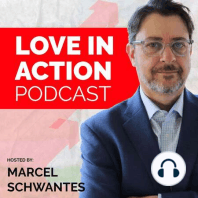38 min listen
Harnessing the Power of Our Shared Humanity with Adam Waytz
FromLove in Action
ratings:
Length:
41 minutes
Released:
Jun 18, 2020
Format:
Podcast episode
Description
Adam Waytz is an award winning social psychologist, and Associate Professor at Northwestern University’s Kellogg School of Management. His work has been published in The New York Times, Harvard Business Review, and The Wall Street Journal. He joins Marcel Schwantes on this week’s show to discuss his new book, The Power of Human: How Our Shared Humanity Can Help Us Create a Better World. They chat about our innate need for human interaction, and why we need to see each other as fully human.Marcel calls Adam’s book “timely and crucial.” [2:30]Adam does research about “how thinking people think about other thinking people.” He is trying to understand why we treat others kindly or aggressively based on how much we consider their humanity. [5:00]Active dehumanization is seeing another person or social group as non-human (the rationale for slavery, genocide, and ethnic cleansing). Passive dehumanization, which is more widespread today, is just overlooking other people or groups as thinking, feeling human beings. [6:50]Adam describes four pillars of dehumanization: Political polarization - “People on the political left and people on the political right see less eye-to-eye, have more dehumanizing depictions of each other, are less inclined to mingle with each other, have less interest in each other,” Adam explains. [10:30]Social stratification - people of different socioeconomic classes have less in common with one another, which often breeds animosity. [11:36]The rise of automation - more technology means that we rely on humans less and as such we don’t see each other as often. [12:17]Growing marketization - Adam says that our interactions with one another nowadays is moving away from community and more toward buyer-seller relationships. [13:49]“The presence of humans is psychologically important and powerful,” Adam argues. He explains how human touch enhances trust and empathy. We place more value on objects made by human hands. The more we perceive humanness in others, the more we care about them. Humans influence us to do positive things and engage in sometimes difficult collective actions, Adam says. We’re inclined to work harder for the benefit of others than for our own self-interest. [17:30]Marcel and Adam discuss the power of daughters. Research proves that leaders with daughters are more concerned about gender equality and tend to invest more in corporate social responsibility. Adam says that it demonstrates the power humans have to influence you to change your mind and become interested in their wellbeing. [20:11]“...there's a tremendous benefit to getting employees to recognize the beneficiaries of their work,” Adam comments. Knowing that their work has impact and that their company cares about impacting others does more for employee engagement than even a pay raise, he adds. [23:19]Marcel asks Adam to explain his counterintuitive recommendation to increase employee disengagement to humanize the workplace. [24:45]“In virtually any conflict you have a power disparity. ...I think the way forward to increase common humanity is not to start with this idea that we're all humans, but to be really comfortable with saying we have differences, and because we have differences, we have different goals,” says Adam. “...We have divergent opinions, and we have to work within those different ways of resolving conflict… High power groups really benefit from listening; low power groups really benefit from expressing hurt.” [29:03]Adam feels that the issues going on in the world today are forcing us to think about what a better society would look like. He advises listeners to reconnect with someone they haven’t spoken to in a while. [35:14]Marcel cites Adam’s book: “Let robots do the robotic work and let humans do the rest.” [38:33]ResourcesAdamWaytz.comThe Power of Human: How Our Shared Humanity Can Help Us Create a Better WorldMarcelSchwantes.com
Released:
Jun 18, 2020
Format:
Podcast episode
Titles in the series (100)
What You’re Getting Wrong About Leadership with Ashley Goodall by Love in Action
